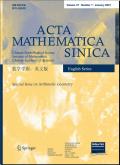Single Peak Solutions for a Schrödinger Equation with Variable Exponent
IF 0.8
3区 数学
Q2 MATHEMATICS
引用次数: 0
Abstract
We study the following Schrödinger equation with variable exponent
$$ - \Delta u + u = {u^{p + \epsilon a(x)}},\,\,\,u > 0\,\,{\rm{in}}\,\,{\mathbb{R}^N},$$
where \(\epsilon > 0,\,\,1 < p < {{N + 2} \over {N - 2}},\,\,a(x) \in {C^1}({\mathbb{R}^N}) \cap {L^\infty }({\mathbb{R}^N}),\,\,N \ge 3\) Under certain assumptions on a vector field related to a(x), we use the Lyapunov–Schmidt reduction to show the existence of single peak solutions to the above problem. We also obtain local uniqueness and exact multiplicity results for this problem by the Pohozaev type identity.
变指数Schrödinger方程的单峰解
我们研究了以下Schrödinger变指数方程$$ - \Delta u + u = {u^{p + \epsilon a(x)}},\,\,\,u > 0\,\,{\rm{in}}\,\,{\mathbb{R}^N},$$,其中\(\epsilon > 0,\,\,1 < p < {{N + 2} \over {N - 2}},\,\,a(x) \in {C^1}({\mathbb{R}^N}) \cap {L^\infty }({\mathbb{R}^N}),\,\,N \ge 3\)在与a(x)相关的向量场的某些假设下,我们使用Lyapunov-Schmidt约简来证明上述问题的单峰解的存在性。利用Pohozaev型恒等式,得到了该问题的局部唯一性和精确多重性结果。
本文章由计算机程序翻译,如有差异,请以英文原文为准。
求助全文
约1分钟内获得全文
求助全文
来源期刊
CiteScore
1.00
自引率
0.00%
发文量
138
审稿时长
14.5 months
期刊介绍:
Acta Mathematica Sinica, established by the Chinese Mathematical Society in 1936, is the first and the best mathematical journal in China. In 1985, Acta Mathematica Sinica is divided into English Series and Chinese Series. The English Series is a monthly journal, publishing significant research papers from all branches of pure and applied mathematics. It provides authoritative reviews of current developments in mathematical research. Contributions are invited from researchers from all over the world.

 求助内容:
求助内容: 应助结果提醒方式:
应助结果提醒方式:


